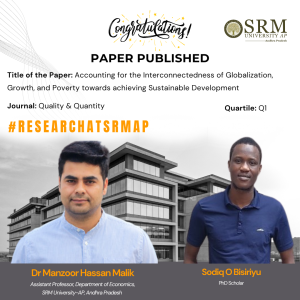The poor in India has continuous future benefits from globalization through improved healthcare – A new research from SRM University-AP economists
 In a groundbreaking study, Dr. Manzoor H. Malik, an Assistant Professor in the Department of Economics, and Sodiq O. Bisiriyu, a Research Scholar, have developed a comprehensive framework known as the globalization-growth-poverty (GPP) triangular nexus.
In a groundbreaking study, Dr. Manzoor H. Malik, an Assistant Professor in the Department of Economics, and Sodiq O. Bisiriyu, a Research Scholar, have developed a comprehensive framework known as the globalization-growth-poverty (GPP) triangular nexus.
This innovative model examines the interplay between globalisation waves, economic growth trends, and their collective impact on poverty reduction in India, aligning with the nation’s commitment to achieving Goal 1 of the Sustainable Development Goals.
The researchers used three different indicators of poverty, encompassing the monetary and non-monetary constructs. The research controls for the impact of government development spending and domestic investment in the GPP nexus. The result of the research validates the significant globalization-led growth hypothesis in the short run and establishes the existence of the GPP triangular nexus in India. Additionally, the researchers found positive association of globalization and growth with monetary and non-monetary poverty measures in the short-run while the impact on monetary measure in the long-run is ambiguous.
Finally, the results offer significant insight into the impact of government development spending and domestic investment on poverty. The results prove that government development expenditure in India is detrimental to non-monetary poverty while domestic investment have insignificant impact on all poverty constructs.
From policy perspective, the researcher said, “the short-run validation of globalization-led growth hypothesis for India is challenging and calls for government broad-based framework to tackle impediments of long-term globalization-led growth and monetary poverty benefits”. They emphasized that only sustained long-term growth can accelerate the vision of India as stated in “Viksit Bharat 2047” agenda. Published in the esteemed ‘Quality & Quantity’ journal by Springer, with an impact factor of 2.87, this study provides valuable insights for academics, practitioners, and policymakers. It sheds light on the complex dynamics shaping contemporary socio-economic environments and offers evidence-based analysis supported by an extensive review of relevant literature.

